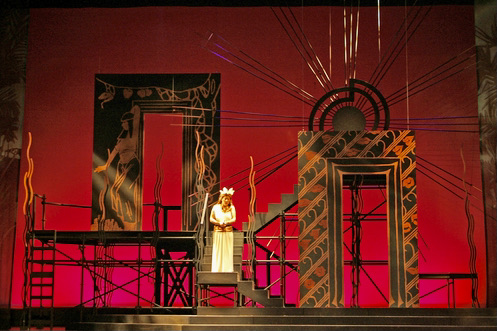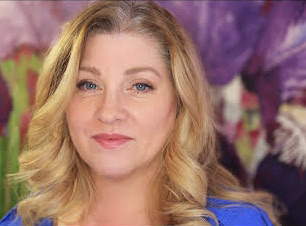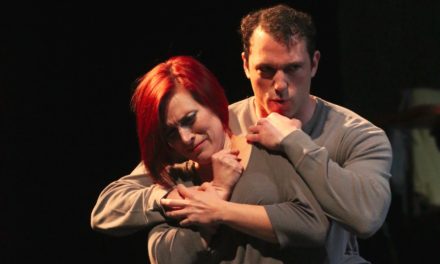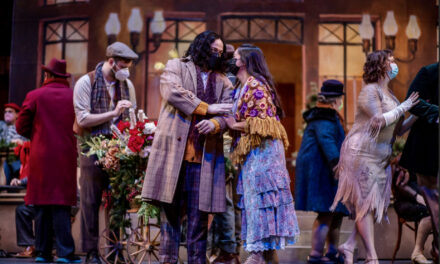By Randi Bjornstad
Like almost everything else these days, putting together the Eugene Opera’s production of The Magic Flute, which will be onstage at the Hult Center for the Performing Arts on Jan. 28 and 30, has had its share of uncertainty, but with covid-related protocols in place, the show will go on.
“Deciding to go ahead with it was definitely something we weighed carefully,” opera executive director Erika Rauer said. “With opera, planning starts years in advance, so we had a lot to consider, especially after Tosca was cancelled last year because of the pandemic, but things looked better for this year, so we decided to go forward.”
Vaccination requirements and regular covid testing that have been in place at the Hult Center for the past six months helped make the decision easier, she said, “and we have been monitoring the situation very closely. We have contingency plans in place in case singers get sick — we think we have done all we can to make sure things go smoothly.”
The Magic Flute hasn’t been done for a long time at Eugene Opera — in fact, only twice before, first in the 1996-97 season and more recently in 2007-08. But this time will be special, Rauer said.
“This is not a remount of an opera, this is brand new,” she said. “We have been working with John Park at the University of Oregon, and he and his animation students have created projections that will give the production a really atmospheric component. We had a grant from Opera America that was created to help smaller local opera companies do this kind of collaboration.”
Along with Park’s projection design, Joe C. Klug provided scenic design.
Another unique part of this production of The Magic Flute is having Valerie Rachelle directing the creative team, Rauer said.
Rachelle always has been inspired by the magic of slightly creepy characters as expressed by American writer, artist, and Tony Award-winning costume designer Edward Gorey, Rauer said, “and so there is a lot in this show that suggests illusion and magic — she knows a lot about that world.”
In fact, Valerie Rachelle seems to lead something of a magical existence. She grew up in Eugene, but she also traveled the world with her parents, who were professional “illusionists.” She became a ballet dancer, including serving an apprenticeship with the Eugene Ballet Company, and she also trained as a classical singer. She earned a bachelor’s of fine arts in acting and a master’s of fine arts in directing, on top of choreographing, starting a not-for-profit theater dedicated to producing new works, directing, teaching movement and audition skills at the college level, including at the University of Southern California. She currently teaches musical theater at Southern Oregon University, serves as artistic director of the Oregon Cabaret Theatre in Ashland, and does freelance directing and choreographing
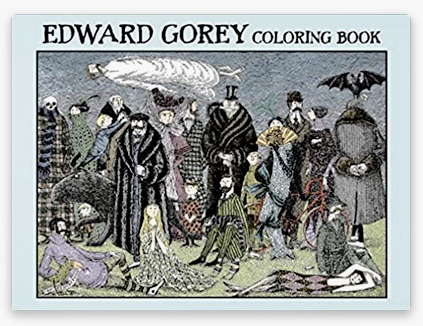
Writer, artist, and costume designer Edward Gorey’s work helped inspire the costumes for Eugene Opera’s production of Mozart’s The Magic Flute
All of that helps explain the costumes that the audience can expect to see at The Magic Flute, the work of costume designer Kristie Mattsson.
“Our costume racks are full of long fur coats, and lots of black and white,” Rauer said. “It’s not we were incorporating Edward Gorey’s work, but there’s definitely an inspiration of that kind of world of magic.”
Maestro Andrew Bisantz will be on the podium, conducting Wolfgang Amadeus Mozart’s musical score.
The Magic Flute has a large cast, and Eugene Opera has benefited from the fact that because of the coronavirus pandemic, many top-level artists left some of the main performance meccas to return to their home territories, including several from the West Coast and Pacific Northwest who might otherwise not have been available.
The cast at Eugene Opera includes Derrek Stark as Tamino and Camille Ortiz as Pamina, with Zachary Lenox (Papageno), Melanie Spector (Queen of the Night), Andrew Potter (Sarastro), Benjamin Brady (Sprecher), Saori DeBruyn, Sarah Beaty, and Rachelle Moss (first, second, and third ladies), Jocelyn Thomas (Papagena), Tim McCoy (Monostatos), Esteban Zúñiga Calderón (First Priest/First Armored Man), and Dylan Bunten (Second Priest/Second Armored Man).
Then there’s the plot.
Tamino is a prince who is lost somewhere outside his own kingdom, and he’s being pursued by an evil monster when three mysterious ladies rescue him by killing the monster. They show him a picture of Pamina, the daughter of the Queen of the Night, and of course he immediately falls in love with the image. Then they tell him that she is being held captive in a castle by the evil Sarastro, and Tamino determines to save her. They give him a magic flute, and accompanied by half-man/half-bird character named Papageno, he sets off.
The plot thickens. It turns out that Sarastro is not the bad guy — he’s trying to protect Pamina from the real villainess, her own mother, Queen of the Night. Then Sarastro tells Tamino that he has to carry out a series of tasks to prove that he is worthy of the beautiful Pamina. Thanks to the magic flute, Tamino is up to the task, but at the last moment, the Queen of the Night arrives at the castle, prepared to destroy it. But Sarastro intervenes and vanquishes the Queen, and all’s well that ends well, but that’s another story.
Eugene Opera’s The Magic Flute
When: 7:30 p.m. on Friday, Jan. 28 and 2:30 p.m. on Sunday, Jan. 30
Note: Conductor Andrew Bizantz will give a free lecture that starts 45 minutes before each performance.
Where: Silva Concert Hall, Hult Center for the Performing Arts, One Eugene Center (7th and Willamette streets), Eugene
Tickets: $15 to $79, available at the Hult Center box office, 541-682-5000 or online at hultcenter.org
Covid protocol: https://hultcenter.org/health_safety/#vaccination-negative-test-requirement

